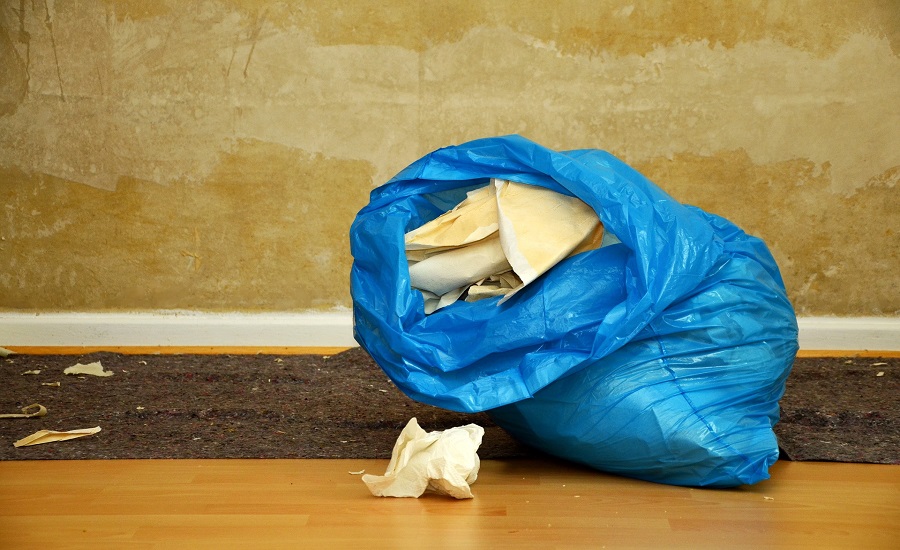The Back Story: As with many supplies used in the industry, the price of trash bags has increased. We buy lots of trash bags. At the same time, we are working on developing our course, “Not Just Trash”, which can be more complicated than you may imagine. I have lots of trash stories and a secret waste management passion. Part of my trash training inspiration is a quote from a co-worker, “Everyone laughs, but you can tell the new people on a water loss because they overfill the trash bags.”
All these dynamics have led to a lot of “trash” talk. Something smelled in my trash, enter odor control 101 - remove the source, so I removed the trash bag that had plenty of room for more trash. I embarked on a simple trash gathering stroll focused on getting the most out of the bag. Next thing I know, I was muttering about the trash bag price increase, the need to train people on using the right trash bag for the right job, weight, types of debris, and so on and the story of putting too much debris in the bag on a water loss, it becomes too heavy, the bag may break, safety issues, and so on. All this information was swirling around and then a co-worker simply said…
“Lisa, did you ever think of buying smaller trash bags?”
The Answer: No, I had never thought of that.
I am totally embarrassed to share with everyone that I had never thought to buy a smaller bag.
The Brilliance of a Smaller Trash Bag:
- Safety: A smaller trash bag will reduce the risk of a bag becoming too heavy to safely transport.
- Secondary Damage and Inefficiency: A smaller bag reduces the risk of putting too much weight in the bag and the bag breaking, making a mess.
- Cost, Waste, Environment: The smaller bags cost less. The bag in question is mainly used for construction types of debris and much of the bag goes to waste due to the nature of the debris and its weight. It is also better for the environment.
I share this with you because it reminded me of some very important concepts that we must remember as leaders and problem solvers:
- “The way we have always done it”: Almost 21 years of buying the same bag, left us settled. Nobody was challenging the status quo or pushing for an improvement. We must constantly push the boundaries, inspire each other, and maintain a “continuous improvement” culture.
- Invite new members of the team to share any observations or opportunity towards improvements. Fresh eyes may sometimes identify opportunities that others may miss.
- Challenge the team to make an improvement to something that on the surface does not seem to be a “problem”.
- Identify the Problem: In Getting to the ROOT of the Problem, the first step is to identify the actual problem. I really was just trash bag rambling and did not define the problem which would have been simple and likely quickly solved.
- Listen: When we all really listen to each other, so much good can come of it. My co-worker was listening to my rambling. In turn, I listened to his simply stated solution.
- Simplicity: Our world is full of complexities at every turn. As restorers, it is in our nature to be problem solvers. However, we must be careful to not over complicate things; not to over complicate any problem or the potential solutions. Sometimes simple problems deserve a simple solution. On the other hand, sometimes even complex problems or what seems complex deserves a simple solution.
A practical example:
Problem: Strained resources and manpower.
Process Change: The process was that when equipment was pulled from a job; it gets immediately cleaned and restocked by the person who pulled the equipment. The change was to establish an equipment drop location and schedule the cleaning and restocking of equipment.
Result: This process change gave more flexibility in managing and juggling the resources of the company. It also improved the scheduling and capacity. The skilled and trained team members had more time to do their specialized jobs. The equipment cleaning needs could be scheduled, and it was easier to train and develop skills to clean equipment than many of the other skills and trades that were needed.
In our complex and busy worlds, it is easy to become consumed by the chaos. Enjoy and look for simple solutions. Accept the simplicity when it can be found and remember that even if a “solution” did not work, just try another way. I am thankful that my big trash bag “problem” reminded me of some very important things. It is also very gratifying when you take even a little step forward towards improvement.
May you find simple solutions and much continued Restoring Success.


